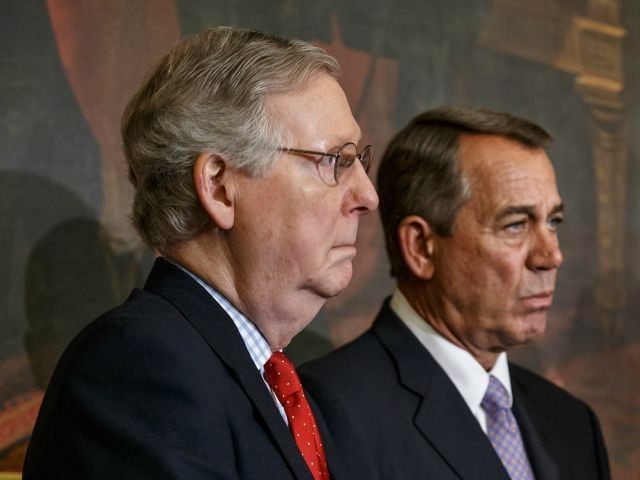As even the most entrenched pundit will acknowledge, the opening months of the 2016 campaign have been very good to political outsiders. There is the rise of Trump, obviously, but also the growing support for candidates including Ben Carson, Carly Fiorina and Ted Cruz. Candidates with any association with Republican leaders in Washington or the political status quo are struggling.
Keep in mind, much of this groundswell against the Republican establishment has occurred in August, while Congress has been in recess. Next week, however, Congress returns to tackle, among other items, Obama’s deal to lift sanctions on Iran and government spending for the year. Another replay of Republican leaders tendency to avoid confrontation with Obama will super-charge outsiders’ momentum.
Government’s spending authority expires at the end of September. Senate Majority Leader Mitch McConnell has already vowed to avoid any government shutdown, meaning some kind of continuing resolution in spending will have to be passed by the end of the month. House Speaker John Boehner, who also wants to avoid a shutdown, has suggested short-term spending bills to keep the government open during negotiations.
To the extent that McConnell and Boehner have a legislative strategy, it is to avoid confrontation or legislative controversy and strengthen their political positions at the ballot box. The fundamental flaw in their strategy is that they attained the political position they currently have by promising robust challenges to Obama’s policies.
The voters who powered them to the majority are angry Republicans haven’t kept their promises and, because of a lack of confrontation, less-engaged voters simply assume there is no real meaningful difference between the parties.
Neither Boehner nor McConnell seem to understand that confrontation is the life-blood of politics. Voters want a clear choice, not an echo. More importantly, confrontation is a way to define the terms of the political debate, put your political opposition off-balance and gain the support necessary to enact your policy agenda.
The Boehner/McConnell approach is similar to a poker player who announces at the start of a tournament that he will never bet higher than the blinds and pins his hopes on drawing a series of inside straights. He will take a bluff at face-value and immediately fold anytime an opponent raises the stakes, assuming they have a better hand.
The consequences of this “strategy” can be seen in primary polls across the country. In a recent poll of Iowa caucus voters, two-thirds of Republicans said they wanted a candidate from outside Washington who could bring a new approach to governing. Iowa is not a hot-bed of conservative Tea Party activism. Even moderate and liberal Republicans strongly preferred the outsider candidates in the poll. The brewing Republican revolt is breaking out across the party’s ideological spectrum.
That said, the rebellion is most intense among conservative voters, who will dominate many early states’ Presidential voting. Boehner, McConnell and their allies will deflect any move to defund Planned Parenthood, who has been recently scandalized by a series of shocking videos detailing the harvesting of baby organs, in any government spending bill. In the Senate, Republicans will implement Sen. Bob Corker’s plan to allow the Iran deal to go through while allowing Republicans to vote against it. The Republican plan may even let Democrats off-the-hook for what ought to be a politically damning vote.
Below the headlines, Republicans in Congress will likely maneuver to resurrect the Export-Import Bank, which provides mega-corporations with taxpayer-backed financing. The Depression-era Agency expired at the end of the June, but business groups are threatening to withhold all political donations unless the bank is reborn. Congress will also try to shore-up the Highway Trust Fund, which is creaking beneath the weight of decades of government mismanagement.
And, of course, before the end of the year, Republicans in Congress will have to authorize the federal government to borrow more money, increasing the already unsustainable national debt.
While this plays out, there will be no action on ObamaCare or illegal immigration. Congress will also simply watch as Obama regulatory actions undermine any prospect of future economic growth.
Further, it bears overstating that after winning the Senate Majority on a vow to reverse Obama’s abuse of Executive Power on Amnesty, one of the first actions of the Senate Republicans was to grant Obama more Executive Power to pursue a secret trade deal. They also, naturally, took no action on Obama’s abuse of executive authority on immigration. The actions of the Senate Republicans, of course, were heartily supported by the increasingly statist U.S. Chamber of Commerce.
In other words, if you think the political outsiders are doing well in the Presidential primary now, just wait until Republicans in Congress return, openly pursue the agenda of their biggest corporate donors and squander whatever political capital they still have.
During the Civil War, Union General George McClellan refused to battle the Confederate Army unless he had the overwhelming forces he claimed he needed. When we would finally acquiesce to fight, he proceeded to squander his innumerable advantages. McClellan even had the Confederate battle plan ahead of the Battle of Antietam and still only managed to eke out a very bloody stalemate.
Unfortunately for the Republic, Boehner and McConnell clearly skipped this chapters in history class. For political outsiders, though, the continued tone-deafness of Republican leaders is Heaven-sent.

COMMENTS
Please let us know if you're having issues with commenting.